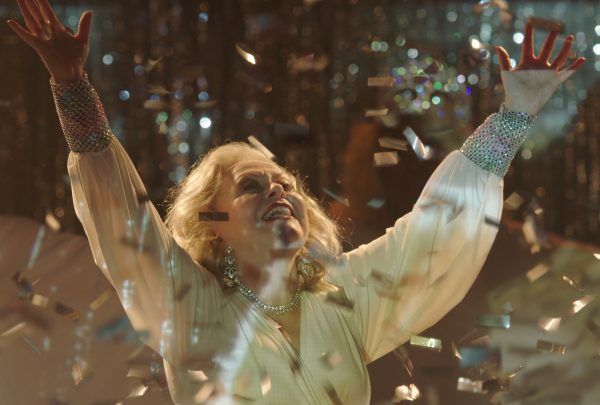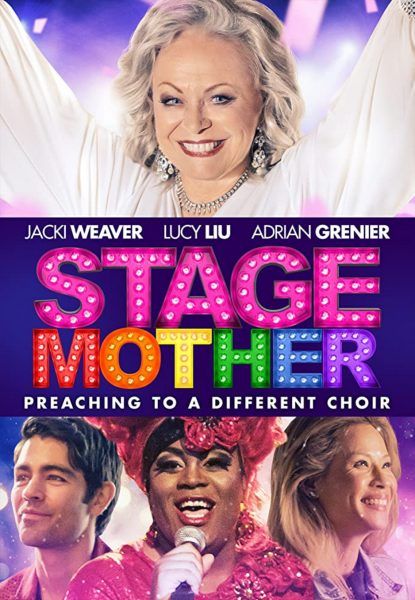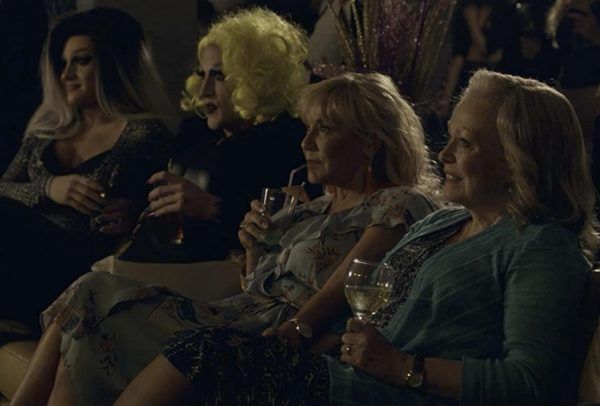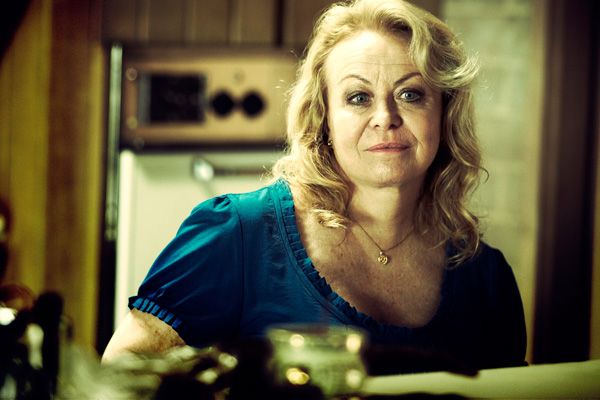From director Thom Fitzgerald and screenwriter Brad Hennig, the indie dramedy Stage Mother follows conservative Texas church choir director Maybelline (Jacki Weaver), a grieving mother who learns that she’d inherited her recently deceased son’s San Francisco drag club. Leaving her closed-minded husband behind, she becomes determined to find new meaning for her life by redecorating the club and redesigning their show in a way that helps her connect with and get to know her son again.
During this 1-on-1 phone interview with Collider, Aussie actress Jacki Weaver talked about why the drag world is so close to her heart, what led her to a gay nightclub at 15, why she so deeply connected to this character, keeping the story truthful and honest, having Nova Scotia stand in for San Francisco, and getting to sing in the film. She also talked about whether she’s ever seen the American TV series of Animal Kingdom, her path from Australia to Hollywood, and how she gets in and out of characters.
Collider: When someone comes to you and says, “We’d like you to play a Texan who inherits her estranged son’s San Francisco drag club,” what was your reaction to that?
JACKI WEAVER: Well, the gay world and the drag world is quite close to my heart. I’ve been in those circles since I was just a teenager. It’s been many years. I love a story where the character has a journey to make, and this one certainly makes a journey from her sheltered life in Texas to the wilds of San Francisco. So, I liked the fact that she has a journey to make.
You mentioned being close to the drag world. How did that happen?
WEAVER: Well, I got my first job on the stage when I was 15 years old in a production of Cinderella, and some of my first friends on stage were gay people. And then, I started dating Prince Charming and he was a rock star at the time. We went to a gay nightclub and there I was, at 15, and it was a very lavish show. There was nothing crappy about it. It was a beautiful show, like [something in] Las Vegas or The Rockettes. In those days, in 1962, they were called female impersonators, and I became fascinated and full of affection for them. I’ve been going to drag shows ever since. Even now, my husband and I still like a drag show. We sometimes go to Hamburger Mary’s in West Hollywood, where we live, and that’s where you can see Jackie Beat. She’s in Stage Mother, and she’s fabulous. She’s such a good actor, too. Many of my friends are a part of the LGBTQ community, so it’s my home away from home, so to speak.
When you read this script, what was it that most drew you to this woman? How did you find yourself connecting with her?
WEAVER: I think it was the mother love. It’s obvious that she loves her son and she’s been deprived of his company for many years because of the intransigence of that domineering husband, who has disowned the boy because he’s gay, and they live in such a narrow, sheltered milieu. Being a choir mistress in a church and being the kind of woman who swore to love, honor and obey, she’s gone along with it, with a broken heart, for many years. And of course, when the tragedy happens and the boy dies, she finally gets the courage to defy the husband and say, “I’m going to the funeral. I don’t care what you say.” That’s where her journey starts, when she’s so shocked at what’s going on at the funeral that she walks out, but she still wants to get to know her son’s partner played by Adrian Grenier, a beautiful actor, and she meets her son’s best friend, played by the absolutely wonderful Lucy Liu as a rough blonde girl, so unlike her usual elegant self. And then, quite inadvertently, she inherits the drag club and she sees that it’s losing money, so she puts a few plans in place, redecorating the club and teaching the queens how to sing themselves instead of lip-syncing to other people’s music. Along the way, she becomes their den mother. One of my favorite scenes is when one of the drag queens, played by Oscar [Moreno], is estranged from his mother, and she tracks her down in a café and says to her, “Look, you might lose him. You have to make friends again, before it’s too late, ‘cause life is short." I like the way the story has you crying in one minute and laughing in the next. That’s what life is like, so it’s a very honest slice of life. I love how in the end, despite the sorrow, there’s joy. She’s become a part of their community. They love her, and she loves them.
I really love the dynamic between you and Lucy Liu in this. What did you enjoy about working with her and exploring that relationship?
WEAVER: The character is so cheeky and sassy, and straight-talking and blunt-talking, and a little obscene. It was nice playing off of that when my character was so prim and proper, but just trying to be a good woman. So, I think that dynamic worked really well. The credit has to be given to the director, Thom Fitzgerald. He’s wonderful director. He is usually an auteur director who writes his own stuff, and it usually has a gay theme. In this case, the writer was Brad Hennig, and they consulted and polished the script together. I think both Brad and Thom did a lovely job.
It seems like it would be tricky to keep the heart of the film without going too over the top. How did you find and maintain that balance?
WEAVER: You’ve gotta be truthful and honest to keep it like that in the funniest moments and the saddest moments. Brad is a small town boy from Texas, who now lives in San Francisco, so there’s a bit of authenticity there, personally.
What was it like to shoot this in Halifax, Nova Scotia as a stand-in for San Francisco?
WEAVER: There’s a little bit of stock footage of San Francisco, but not very much. Halifax is an old city, it’s a very pretty city, and it’s very hilly, with houses very much like San Francisco, so I think we got away with it. It was pretty cold at the time, and we had some snow. But not many people can afford to film in San Francisco, so it was a budgetary thing as much as anything.
The last couple of times I spoke to you was for Perpetual Grace and Blunt Talk, which were both very different kinds of projects, and you were a part of an ensemble in those. With this, it’s much more of a leading role. What makes a leading role in a film different for you, or is the approach exactly the same?
WEAVER: The approach is exactly the same. The difference is that you have to get up at three or four in the morning six days a week instead of just a couple. That’s the same with the stage, too. I’ve been in 73 plays, including quite a few musicals. When you’re the lead in a musical, you’re there every day for rehearsal, all day long. Whereas if you’ve got a cameo, you can just turn up for rehearsal a couple of days a week. That’s the main difference, but you still treat them with the same reverence and honesty and thoroughness as you do with a lead.
There’s something so wonderful about watching Maybelline with these drag sisters. What are your best memories about working with them and forming the bond between those characters?
WEAVER: They were all so good. I’ve mentioned Jackie Beat, who I adored, and Adrian and Lucy, but Mya Taylor, who’s a trans woman and she was in Tangerine. She’d never done drag before, and it was the first time those other young actors had done drag, too. They did a fantastic job and they looked like drag artists. Allister MacDonald, who has the scene where he has the breakdown and I take the drugs from him, had just finished doing a play on stage where he was playing Shakespeare and he was brilliant, and then he went on to do this. He’s very talented. I loved every minute, and I loved the director. It was a good time.
How did you find the experience of singing and performing the final number in this?
WEAVER: I hadn’t sung for awhile. I sang a little bit in the series Blunt Talk. I am quite experienced as a singer, but just not in America. I did 600 performances of They’re Playing Our Song, and we made an album and it became a gold record. And I did another album. I used to sing quite a lot on television, and I’ve done other musicals. I was in Priscilla, Queen of the Desert in Australia. But I’m not really known as a singer in America. I don’t sing much anymore. I sing the commercials on television, to make my husband laugh.
Do you hope that a film like this might touch the mothers that aren’t as open as Maybelline becomes?
WEAVER: I hope so. I have a little fantasy about a young person who still hasn’t had the courage to come out seeing this film with their parents and then it being a watershed moment where they can finally talk to their parents about it, and become closer. We have become much more tolerant, as a society, certainly in my lifetime, but there are still pockets of society that are very narrow-minded and who refuse to accept the diversity of our sexualities, which are unique to all of us. If just one person changes their mind, watching his film, it’s a wonderful thing.
So many of us became familiar with your work through Animal Kingdom. Have you watched any of the American TV series? What’s it like to know that other people are playing in a world that you helped develop?
WEAVER: To be honest, I haven’t seen any of it. It’s not that I was resentful or anything, I just never got around to it. I’ve seen Animal Kingdom four times, and the fourth time distressed me so much ‘cause it’s terribly dark, and I thought, “I don’t wanna see this again.” I think it’s a fine film, and I think David Michôd is very, very clever, but I didn’t wanna see our film again, and I have the same attitude about the TV series. Bad people are a waste of time.
Do you have a separate process for getting in and out of intense and dark characters like that, when you play them, or is it more just avoiding playing them at this point?
WEAVER: I have a process, but it differs with every role. I’m very instinctive, but mainly, I try to stay focused. I do my homework. I try not to get distracted at all on set, in between takes of things, much like any other actor.
You’ve previously talked about how you were more than happy with the working actor life you had in Australia and that you hadn’t really had this big dream of finding stardom in America, but now that you’ve done as much work as you have in Hollywood, what does your career path feel like at this point?
WEAVER: I like it. I think it’s lovely. I’ve always been fascinated by Hollywood and loved American films. I’ve been going to American film since I was three years old. But it wasn’t something that I thought was possible. I thought it was beyond my reach. And because I always had so much interesting work at home, both on screen and onstage, I was very contented. Hollywood just seemed unreachable and an impossible dream that was never on my agenda. So, to have been embraced by the industry here, I didn’t chase it. I still think it’s an absolute gob-smacking miracle.
Is there a genre that you’ve still not gotten to do, that you would love to do a role in, or a play that you’d love to do in the theater?
WEAVER: There were lots of them, as the years have gone by, that I didn’t get, that I wanted, but I’m too old for them now. I also got lots of great roles that I did want, so no regrets whatsoever. I get sent a lot of scripts, and I probably only accept a fraction of them. There’s nothing like the joy of reading a new script and thinking, “This is really interesting. I’d really like to have a shot at this.”
Stage Mother is now available on-demand.





